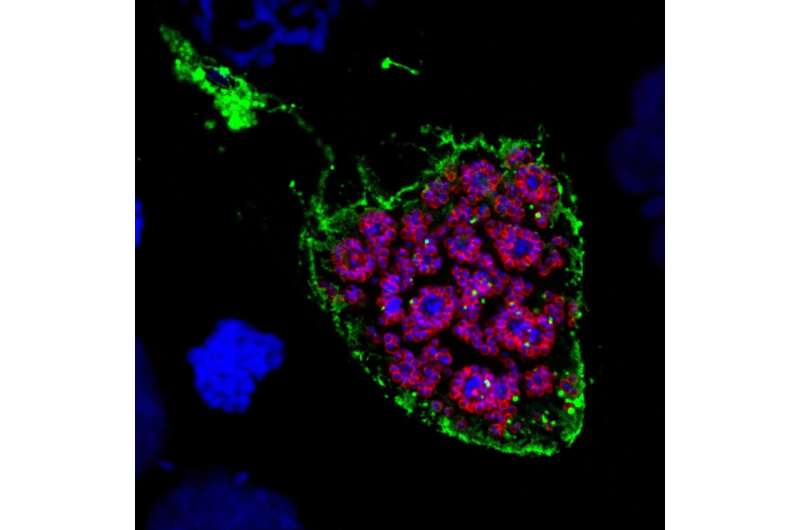Researchers identify defense mechanism of malaria parasite

Portuguese researchers at Instituto de Medicina Molecular (iMM) Lisboa have identified a defense mechanism by which the Plasmodium parasite can survive inside its host's liver cells, a crucial stage in which it acquires the capacity to infect red blood cells, causing the symptoms associated with malaria.
The Plasmodium parasite replicates inside it's host's liver cells surrounded by a membrane that protects it against threats present in the intracellular environment, namely autophagy, a process that is triggered upon infection and in which cells degrade materials that are no longer necessary. Importantly, this process is dependent on a protein called LC3.
Although autophagy is activated by host cells after infection, the malaria parasite is resistant to this cellular defense mechanism, unlike other more susceptible pathogenic agents. However, researchers led by Maria Mota have now found the Achilles heel of the malaria parasite: a protein called UIS3 that binds to LC3 and forms a type of protective shield against autophagy. Without this protection, the parasite becomes vulnerable and is rapidly eliminated by the host.
The study now published in Nature Microbiology reveals that parasites lacking the UIS3 protein cannot survive inside mice liver cells. However, if the host's autophagy capacity is compromised, the parasite gains back its capacity to infect cells.
These results show that UIS3 protein could lead to the development of novel targets against hepatics forms of malaria, which, in some Plasmodium species, may persist in a dormant state and cause symptoms several years after the first infection.
It is particularly relevant to identify new therapeutic targets at a time when several cases of drug resistance are occurring, specifically in Southeast Asia. In the future, the team seeks to identify compounds that can block the parasite's capacity to inhibit cellular autophagy and test its efficiency as novel drugs against malaria.
More information: Eliana Real et al, Plasmodium UIS3 sequesters host LC3 to avoid elimination by autophagy in hepatocytes, Nature Microbiology (2017). DOI: 10.1038/s41564-017-0054-x
Journal information: Nature Microbiology
Provided by Instituto de Medicina Molecular





















